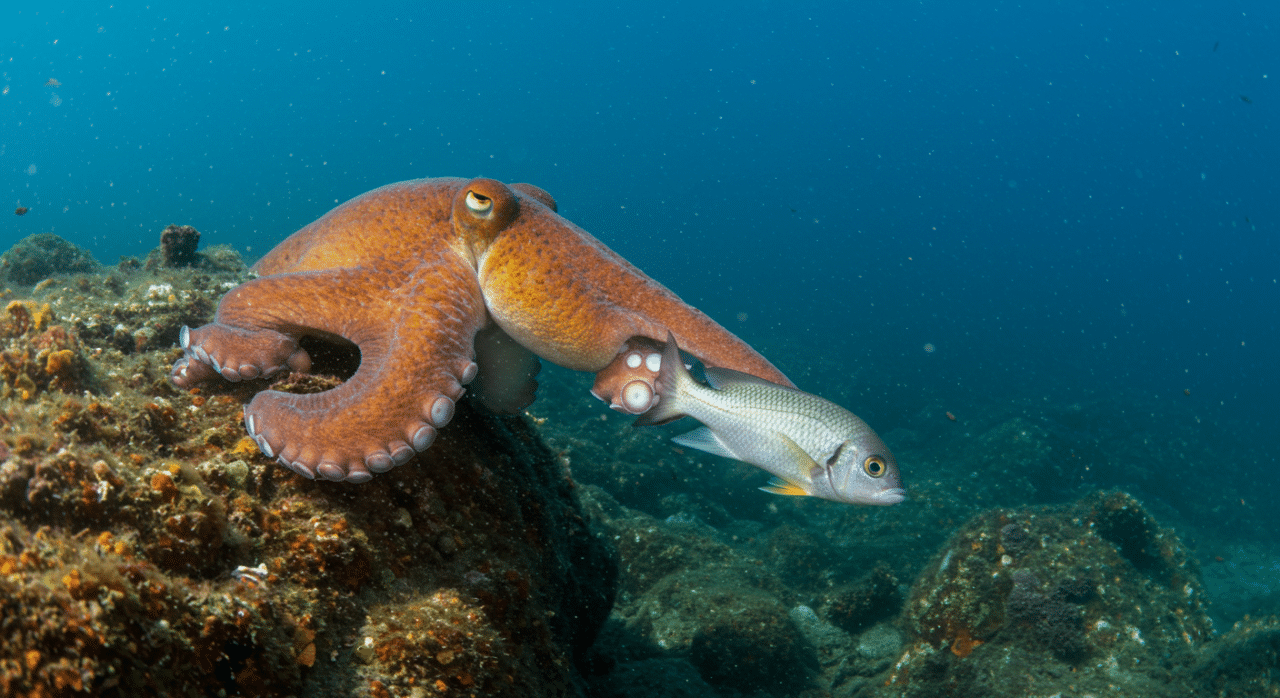Wild and Wacky Animal Stories: 5 Astonishing Behaviors in Nature
Estimated reading time: 7 minutes
Key Takeaways
-
- Discover the fascinating intelligence of octopuses and their problem-solving skills.
-
- Explore the unique social behaviors of dolphins and penguins.
-
- Uncover the bizarre fungal manipulation of ants and the unique digestion of sloths.
-
- Understand how these behaviors reveal evolutionary adaptations in the animal kingdom.
Table of Contents
Nature always surprises us with its diversity of life and behavior. These five wild animal stories will make you rethink what you know about the creatures we share this planet with.
The Octopus and the Fish: A Tale of Intelligence and Cooperation
In the depths of the ocean, octopuses have been observed punching fish to stun them before eating. This behavior may seem aggressive, but it reveals a level of problem-solving and intelligence that is rare in the animal kingdom. Some researchers even compare it to multi-agent systems in AI, where different entities work together towards a common goal.
This intelligence is not just limited to predation. Octopuses have also been known to use tools, escape from enclosures, and even play with their food. These behaviors suggest that octopuses may have a form of consciousness that is still not fully understood.
Dolphins Getting High on Pufferfish
Dolphins are known for their playful nature, but recent observations have revealed a more unusual behavior: they have been seen passing around pufferfish, which contain toxins that can induce a trance-like state. This behavior has been interpreted as a form of playful interaction or even a way to relax.
While this behavior may seem strange to us, it highlights the complex social structures of dolphins. Their ability to interact in such a way suggests a high level of communication and cooperation within their pods.
Same-Sex Penguin Adoption
In the frigid lands of Antarctica, same-sex penguin couples have been observed adopting and raising chicks together. This behavior is not just a curiosity; it is a vital adaptation to the harsh environment, where every pair needs to work together to survive.
This adoption process is not always easy. Penguins are monogamous, and they form long-term pair bonds. However, when circumstances dictate, they are capable of forming new bonds and adapting to new roles within their community.
Zombie Ants Controlled by Fungi
Deep in the rainforests, there exists a fungus that takes control of ants’ bodies, turning them into zombies. This fungus infects an ant and then manipulates its behavior, causing it to climb to high locations where the fungus can spread its spores more effectively.
This is a testament to the complex and often parasitic nature of ecosystems. The fungus relies entirely on the ant to complete its life cycle, while the ant’s behavior is completely altered to serve the fungus’s needs.
Sloths Risking Death to Defecate
Sloths have a unique approach to digestion. Their digestive system is slow, and as a result, they only defecate once a week. However, this process is extremely dangerous for them, as it leaves them vulnerable to predators while they are on the ground.
Despite the risks, sloths are reluctant to change their habits. This highlights the fine balance that animals must maintain between their needs and the dangers of their environment.
Unraveling the Mysteries of the Animal Kingdom
These stories show us that there is still so much to learn about the complexity and diversity of life on Earth. By studying these behaviors, we can gain insights into the tools and methods used in professional research to uncover such fascinating phenomena.

